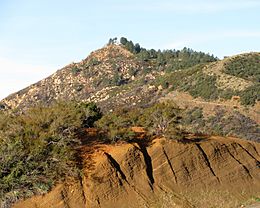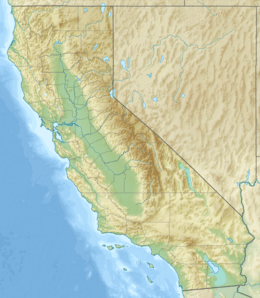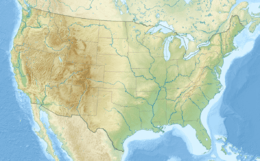La Cumbre Peak facts for kids
Quick facts for kids La Cumbre Peak |
|
|---|---|

Viewed of La Cumbre Peak from the east with a prominent outcrop of the Juncal Formation in the foreground.
|
|
| Highest point | |
| Elevation | 3,997 ft (1,218 m) NAVD 88 |
| Prominence | 1,010 ft (310 m) |
| Geography | |
| Location | Santa Barbara County, California, U.S. |
| Parent range | Santa Ynez Mountains |
| Topo map | USGS Santa Barbara |
| Climbing | |
| Easiest route | Road |
La Cumbre Peak is a tall mountain in California. It stands about 3,997 feet (1,218 meters) high. You can find it north of Santa Barbara. This peak is part of the Santa Ynez Mountains. It is also located inside the Los Padres National Forest.
La Cumbre Peak is the highest point close to Santa Barbara. It has large boulders and pine trees. Nearby, you can see other peaks like Arlington Peak (3,258 feet or 993 meters) and Cathedral Peak (3,336 feet or 1,017 meters).
The Road to the Top
A road called East Camino Cielo leads to La Cumbre Peak. It was built a long time ago, between 1930 and 1931. This road stretches about 18 miles (29 kilometers). It goes from San Marcos Pass all the way to the top of La Cumbre Peak.
When it first opened, the road was only one lane. It had many turns and a slow speed limit of 15 miles (24 kilometers) per hour. Today, many runners and cyclists use this road for training. It's a great place to exercise because it goes uphill for a long time. Plus, there aren't many cars on it.
Spotting Fires from the Peak
A special building was built on La Cumbre Peak to help spot fires. This fire lookout station was finished in the summer of 1923. It was used by the United States Forest Service. Its main job was to watch for wildfires in the area.
In 1946, a new lookout building was constructed. It was called "La Cumbre Peak Lookout." This new building had a special design with high walls and sloped glass. It was quite expensive for its time, costing $6,500. Because it was so unique and costly, it was the only one of its kind ever built. This important lookout station was added to the National Historic Lookout Register in 2010.
 | William Lucy |
 | Charles Hayes |
 | Cleveland Robinson |



